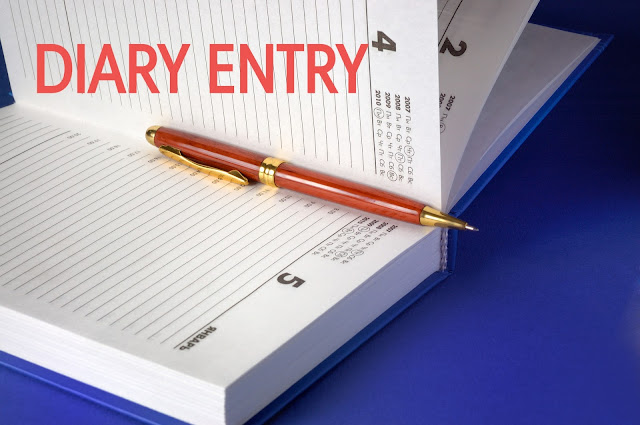 |
DIARY ENTRY :
A Diary entry is considered a personal document. You can illustrate your emotions, thoughts and feelings on a particular issue or incident of a day.
Why should you cultivate the habit of a diary entry?
Writing a diary consistently, enables you, to master the art of writing. You can build confidence to write any other discourse. This habit helps you to write stories, letters, anecdotes et cetera. Your writing will be accepted without any criticism as it is a personal document. Many great personalities have a habit of writing a diary entries. Diary entry helps to keep memories alive when we want to remember. The next generation of a person may get benefitted with the experience mentioned in the diary. Writing a diary with personal events surely reduce the negative emotions of a person and also there is a chance to rethink about their decisions.
What pointers to consider in constructing a diary entry?
You should maintain the day, date and time of the entry.
Start your diary with Dear diary or Hello diary. This salutation you need not follow when you write you write for other than examination.
Content should be divided into paragraphs.
Start your events in chronological order.
Write it in the first person ( I, We, We are, I am ).
Present things in an informal style. This list of informal words helps you to construct a diary entry.
At the end of the diary entry put the name of the writer. ( For a personal document it is not necessary)
If you are writing for an exam, try to write from 100 to 150 words.
Writing a diary is assessed through contexts. Understand the situation or event fully before you start writing on it.
Try to reflect your feelings, introspection, self criticism and future plans.
Use a variety of sentences.
Use your language appropriate to the mood. In other words try to reflect your mood through the words you selected.
Maintain coherence.
REPRESENTATION
10th February 2021,
9:00 p.m.
Dear diary,
It was an unusual experience for me when I was in a village called Siripuram. What a marvellous sight to look at all those hills full of different kinds of trees. I have lived in a city entire of my life. It is for the first time to visit a village which is adjacent to a little forest. Off course! I have visited many villages but, this one is something peculiar.
Squatting by the pond, looking into my reflection in the water, became a great experience for me. I am thankful! God blessed me to go over there and enjoy the atmosphere. It was my brother who asked me to come along with him to that place. My brother's friend was living there. It was almost evening. The time was around 6 o'clock. It was getting dark. but in my imagination, I forgot everything.
After some time, I looked around. There was nobody except me. Holding my heart In my fist, I ran towards the village. Then I could see little lamps from distance. My courage came back to see those lamps. I slowly reached the village and my brother was waiting for me there. I tried to control my emotions not to lose such a wonderful memory. Both my brother and I came to his friend's house to take a good rest.
Alok.
Sample questions to improve your diary writing skill:
1. Imagine that you are the leading politician of your area. Recently, you have been nominated for an award from the government of India for your selfless service towards mankind. Now, write your feelings thoughts and future plans in the manner of a diary entry.
2. You are Raju, you happened to go to visit your grand parents at their village. It was hot summer and you had travel a very long distance. The bus is crowded. Even you didn't get a seat to sit. Now, start constructing a diary based on the above situation by reflecting your mood and feelings.
3. You visited a famous historical place. There you spellbound to see the architecture of the temples and monuments. Now write all your thoughts in the manner of diary entry
4.Imagine that recently you lost your bag of cash and valuables while you are going to a place. You worried a lot about it. Share your thoughts and feelings in the manner of a diary entry.
5.Yesterday it was your birthday. you expected that your father would come to you to greet and celebrate your birthday. In fact you made all arrangements for the same. In reality it was not happened. Now you are very sad to remember the occasion. Write all your feelings and thoughts in the manner of a diary entry.